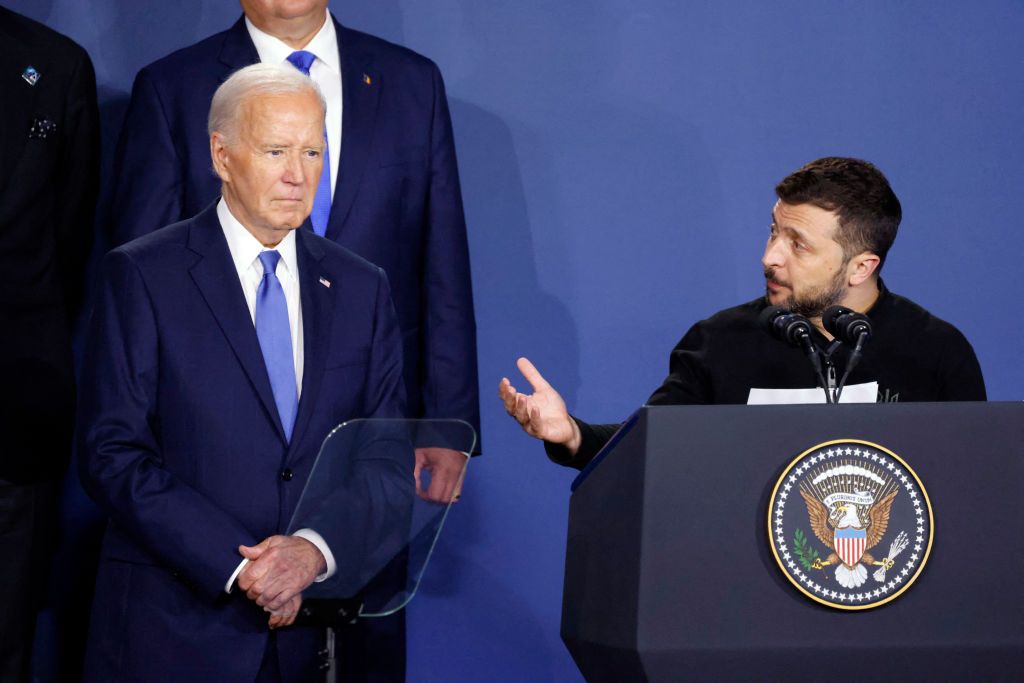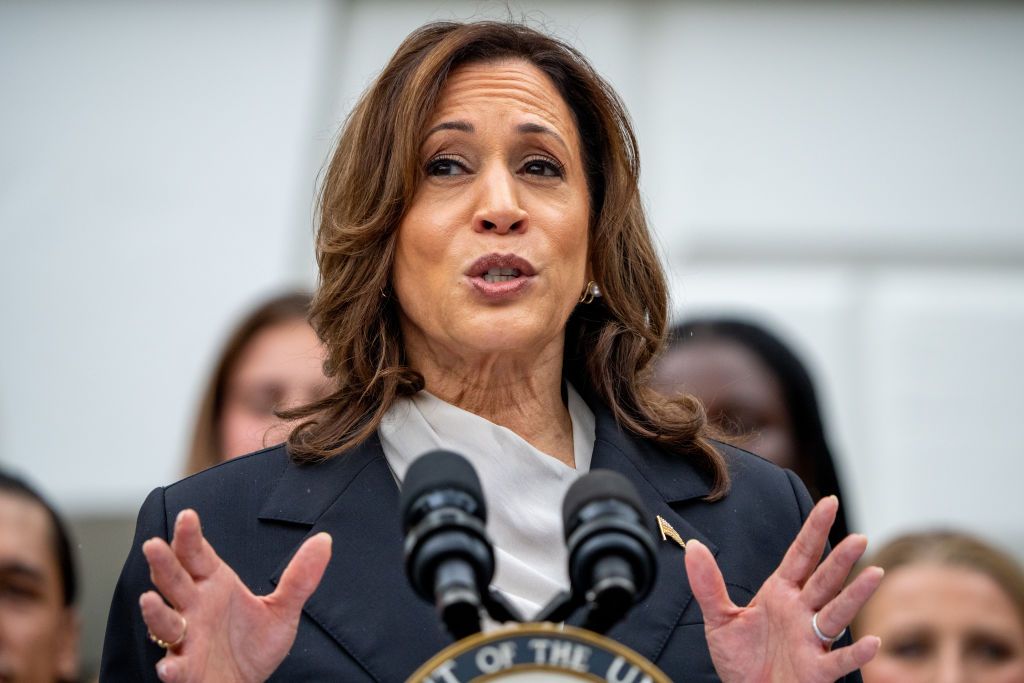Biden could cement his legacy by boosting Ukraine support, experts say
With future support for Ukraine hanging in the balance of the 2024 U.S. election, Ukraine hopes Biden will increase support in his final six months as president.

U.S. President Joe Biden speaks during a news conference with Ukrainian President Volodymyr Zelensky in the Indian Treaty Room of the Eisenhower Executive Office Building in Washington, DC, USA on Dec. 12, 2023. (Chip Somodevilla/Getty Images)
With U.S. President Joe Biden officially out of the running for re-election, Ukrainian soldiers, experts, and advocates have fresh hope that the 81-year-old with decades of transatlantic diplomacy experience will increase support for the country during his final months in office.
“We will keep rallying a coalition of proud nations to stop Putin from taking over Ukraine and doing more damage,” Biden said from the White House in a July 24 address.
“We’ll keep NATO stronger, and I will make it more powerful and more united than any time in all of our history.”
Doug Klain, a U.S.-based policy analyst at the nonprofit advocacy group Razom for Ukraine, spoke with the Kyiv Independent just hours before Biden’s speech, only his fourth from the Oval Office.
“This is his closing act, the significance (of this moment) is not lost on him,” Klain said.
Just this week, Klain noted, Biden delegated responsibilities to the Treasury Secretary and Secretary of State to oversee the possibility of seizing frozen Russian assets to aid Ukraine using a law he signed in April.
Taras Berezovets, a Ukrainian army officer and political analyst, said he expects Biden to take more decisive, harsh action against Russia and President Vladimir Putin over the next few months, particularly with sanctions.
“He doesn't need to think about a second presidential term,” Berezovets said, “and he can make some unpopular decisions in the international arena.”
"This war cannot be lost by Ukraine and by the West because the stakes are too high,” Berezovets said, adding: “It's not about the survival of Ukraine, it's about the survival of democratic values … Western values.”
Berezovets spoke with the Kyiv Independent after a July 25 funeral in Kyiv of an intelligence officer with whom he had served, who died a few days earlier after being severely injured on the battlefield.

How U.S. policy evolves over the next six months and during the next administration of Ukraine’s top ally and supplier of weaponry will shape Kyiv’s prospects on the battlefield. The outgunned and outmanned country, despite its strong defiance, continues to lose lives defending its territory and the right to exist as an independent nation in the face of what local leadership describes as a genocidal war.
Though Ukraine’s Western allies have provided Ukraine with massive amounts of weaponry since Russia launched its full-scale invasion in February 2022, supplies have at times arrived with delays, triggering local officials to complain they were not being given enough swiftly to defeat Moscow on the battlefield decisively.
Berezovets said troops he had contact with since Biden announced he would drop his candidacy last weekend were too busy to react to the news, adding: “Frankly speaking, everyone was actually too bothered with the situation on the frontline.”
What Biden could do for Ukraine during his lame-duck period
Another potential change could be lifting restrictions on Ukrainian strikes inside Russia with American weapons, which Klain is optimistic could happen in the coming months.
Currently, U.S. policy does not allow Ukraine to use U.S.-supplied weapons to strike military targets deep inside Russia out of fear of escalation. Ukrainian President Volodymyr Zelensky has repeatedly asked the U.S. to lift these restrictions. In June, U.S. Secretary of State Antony Blinken hinted that Washington was open to changing these restrictions in the future.
Such a change would be “one of the most practical and most important things” Biden could do over the next few months, said Danylo Lubkivsky, director of the Kyiv Security Forum, along with continuing to provide Ukraine with additional weaponry and equipment that the country needs to secure victories on the battlefield.
Ukraine’s Commander-in-Chief of the Ukrainian Armed Forces Oleksandr Syrskyi recently noted that "when it comes to equipment, there is a ratio of 1:2 or 1:3 in (Russia’s) favor.” Despite taking on heavy losses, Russia continues to advance in its offensive in Donetsk oblast.


Another key issue for Ukraine in Biden’s final months in office is ensuring that “all the promises that were made to Ukraine are delivered in every sense. Political, financial, economic and so on,” Lubkivsky added.
With former President Donald Trump this month securing the Republican nomination and surviving an assassination attempt that boosted his chances to win the presidency, fears loom amid Ukraine’s leadership that his return to the White House could spell abandoned support for Ukraine.
Addressing such concerns, Zelensky said this month that his administration will work with whichever candidate is elected and that working with Trump would be “hard work, but we (Ukrainians) are hard workers.”
Biden has an opportunity not only to secure support from Washington after his term ends, but also from allied Western partners, Lubkivsky noted, and should use security agreements to “ensure that the G7 nations and NATO allies continue to support and protect Ukraine after he leaves the office.”
After receiving assurances of an “irreversible” path toward NATO membership, $43 billion in funding for next year, and 32 countries signing a Ukraine Compact, Zelensky deemed the historic NATO Summit which took place earlier this month a success.
“If you think that the next person is Trump who is going to be unwilling to support Ukraine, then what you're really trying to do is to get the resources out and strengthen the unity amongst NATO allies and partners (like) the EU,” said Jonathan Katz, a senior director and national security expert at the Brookings Institute.
“The good news is (Biden) is unburdened by not having to run a campaign at the same time, so he’ll have time over the next six months to really work with partners and allies to strengthen the agreements that were reached at the NATO Summit,” Katz said.
Potential upsides of a Kamala Harris Presidency
With Democratic support quickly consolidating around Vice President Kamala Harris as the likely presidential candidate for the party, she is expected to continue or even increase U.S. backing to Ukraine if elected.
In the days following Biden’s endorsement of Harris, Ukraine’s Presidential Office head Andriy Yermak met with Harris’s national security advisor. The two discussed the frontline situation and Russian attacks on Ukraine, particularly infrastructure, according to a statement from the Presidential Office.
“(Harris) is a prosecutor at heart, so holding accountable those that commit crimes is something that I think is going to play a particularly important role, and this means holding Putin accountable for war crimes,” Katz said.
According to Razom for Ukraine’s Klain, a Kamala Harris administration would be all about building on Biden’s foreign policy legacy, with room to go above and beyond Biden’s support of Ukraine, and not be as held back by fears of escalation.

One reason for optimism, Klain said, is that top Biden foreign policy appointees like National Security Advisor Jake Sullivan, could be replaced by Phil Gordon, Harris’s current national security advisor. Ukraine advocates would be pleased to see this change, Klain said.
A recent Wall Street Journal report said Sullivan, U.S. Secretary of State Antony Blinken, and U.S. Defense Secretary Lloyd Austin could be replaced if Harris took office. It is standard practice for new administrations to appoint their own cabinet members.
Sullivan has been seen by advocates for U.S. support of Ukraine in Washington as a cautious supporter of Kyiv and at times a roadblock to the U.S. further lifting restrictions on Ukraine’s use of American weapons to strike inside Russia.
However, Katz said the argument that Biden’s foreign policy team is only hesitant to lift restrictions out of fear of escalation with Russia is a vast understatement of the larger geopolitics the administration is balancing.
The Democratic National Convention set Aug. 1 as the day the party’s delegates will begin voting to confirm Harris as the party’s nominee, meaning her pick of a running mate is nearing.













